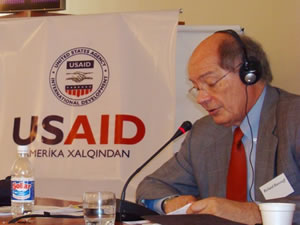USAID, Azerbaijan Officials Partner on Food Security Concerns
The escalating cost of wheat imports in 2007—a year of international shortages—has reignited official attention to food security in Azerbaijan. The USAID Trade and Investment Reform Support Program, together with the USAID Public Investment Policy Project and the Ministry of Economic Development, recently organized a seminar to review the problem and discuss policy options. The seminar, titled “Food Security, Food Crises and Price Stabilization – Lessons from International Experience,” brought together more than 30 high-level government officials and representatives from international donor organizations to review and discuss important policies and tools utilized by other countries to tackle this issue.
 |
| USAID Trade and Investment Reform Support program expert Richard Burcroff made a presentation on key policy implications at the Food Security seminar |
The seminar proceedings ranged from a review of various approaches to short-term price stabilization, to policy and program requisites for a longer-term strategy to achieve food security. Discussed were strengths and limitations of direct interventions and the potential benefits from implementing a market-based approach as part of the national food strategy. Highlighted in this context were the advantages of using instruments that enable effective hedging against grain price fluctuations, such as futures and options contracts purchased from international and regional commodity exchanges.
Important lessons learned from the experience of other countries were presented and discussed, as were the impediments to World Trade Organization accession and implementation resulting from direct interventions and protectionist measures, including trade-distorting subsidies.
The establishment of an interagency commission to address food security and price stabilization issues separately and as a part of a broader agriculture strategy was also discussed. In their concluding remarks, seminar participants commended the high educational and practical value of the seminar and suggested to continue the dialogue during follow up meetings with USAID experts.
Back to Top ^ |


